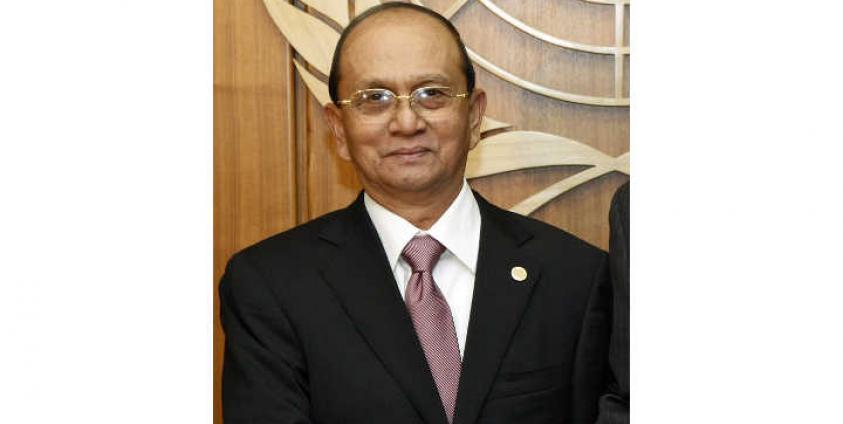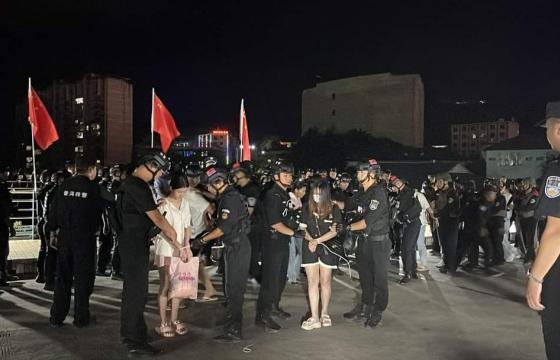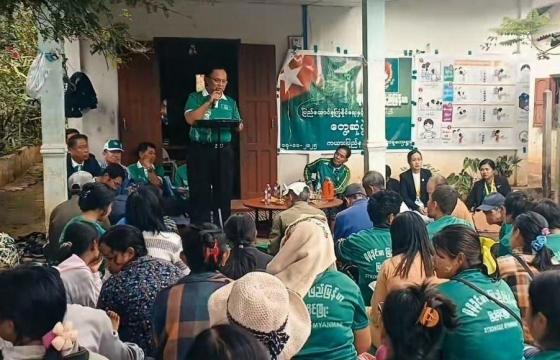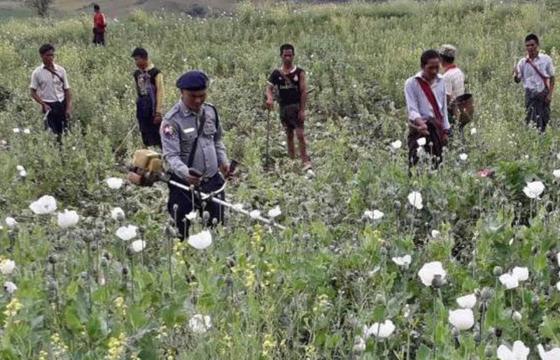From 1962 up to 2011, Burma or Myanmar was a pariah state in every sense of the word. But this perception has drastically changed ever since president Thein Sein came to power in March 2011.
During his tenure, between 2011 and 2016, Myanmar experienced significant reforms across political, economic and social spheres, making transitional substantive steps towards a liberal, capitalist democracy. In this respect, Thein Sein has included the release of thousands of political prisoners, the removal of prior censorship in print media, and the signing of the National Ceasefire Agreement (NCA) with eight Ethnic Armed Organizations, which must be taken as remarkable reform undertakings.

Burma’s former president Thein Sein speaks at the Asia Society in New York, September 27, 2012.
However, the opening of media that has helped to accelerate the political reform process started out first with freeing the National League for Democracy (NLD) leader Aung San Suu Kyi from house arrest at the end of 2010, followed by NLD entering the by-elections in 2012 and its subsequent winning of 43 out of 45 contested seats, and loosening the media control. The NLD went on to win a landslide victory in November 2015 national election, held for the first time in 25 years, and now holds an absolute majority in both upper and lower houses of the Hluttaw (Myanmar’s Parliament). On 15 March 2016, the NLD dominated-Hluttaw elected Htin Kyaw as Myanmar’s first civilian president in 53 years. He was replaced by president Win Myint when he resigned after one and a half year in the office.
In concrete terms, Thein Sein government discontinued the practice of prior censorship in August 2012, with the dissolution of the Press Scrutiny Board in January of the following year; institutionalized the Printing and Publishing Enterprise Law (PPEL) in 2014, which formally abolished prior censorship; established News Media Law of 2014, which promotes higher quality standards in the media with a system of self-regulation; created a corresponding independent regulatory body and code of conduct regarding News Media Law in May 2014; established the Myanmar News Media Council in October 2015; adopted the Broadcasting Law in August 2015, which provides for the creation of a National Broadcasting Council, tasked with licensing broadcasters and adopting a broadcasting code of conduct.
Reforms in media law occurred in tandem with Myanmar’s continuing political transition with the media, civil society and the population at large becoming more vocal about sensitive political and social issues.
Contradictory laws
But the new laws proved contradictory. While the News Media Law protects the rights and editorial freedom of journalists, the Printers and Publishers Registration Law undercut those protections by giving the government the power to revoke or withhold publishing licenses at any time and for any reason.
Moreover, while media laws have undergone positive reforms, Myanmar’s wider legal framework is outdated and has not kept pace with the rapid political and social changes occurring in the country.
UNESCO voiced disquiet
“The selective use of antiquated laws, which restrict freedom of expression has been a means of silencing both the media and civil society on sensitive issues. Many of these laws are contained in the colonial-era Penal Code and pertain to acts such as defamation, public mischief, sedition, and blasphemy. Others are the vestiges of previous military regimes and generally invoked under the pretext of national security. New legislation such as the Peaceful Assembly and Peaceful Processions Law has also commonly been used to restrict protests. Legal restrictions to freedom of expression do have a place in a democratic state. However, they must be narrowly defined and penalties must be proportionate to offences. In Myanmar, laws which place restrictions on freedom of expression tend to be vaguely worded and provide for harsh criminal penalties,” according to a report titled, “Assessment of Media Development in Myanmar,” published jointly by United Nations Educational, Scientific and Cultural Organization (UNESCO) and International Media Support (IMS) Denmark, in 2016.
The report stated: “Freedom of expression is not adequately safeguarded in the constitution or domestic law. Furthermore, Myanmar has neither signed nor ratified many of the international treaties that pertain to freedom of expression such as the International Covenant on Civil and Political Rights (ICCPR). In addition, a Right to Information (RTI) Law does not exist and access to government information remains limited.”
Inequality
Although the PPEL removed many of the legal barriers preventing a pluralistic media, the existence of state-owned print media creates an uneven economic playing field and indirectly promotes media concentration. Many of the daily newspapers that were launched in 2014 have already gone out of business. Myanma Alinn and The Mirror are the country’s two largest state owned print media houses.
The same is true for all domestic TV and radio broadcasters which are either fully state-owned enterprises or joint-ventures between the state and private companies.
Mobile phones
The sector that has developed with leaps and bounds is the Internet Communication Technology (ICT), which the increased ownership of the mobile phone has made possible.
Thein Sein particularly mentioned the important role of mobile phone in his first public speech since he stepped down on March 30, 2016, where he was awarded the institute’s grand prize of the Third Asia Cosmopolitan Awards for his reform efforts convened by the Jakarta-based Economic Research Institute for ASEAN and East Asia.
In his speech, Thein Sein said the spread of mobile phones had been a “key factor” in alerting the leadership to the conditions and attitudes of the population. A sharp fall in the price of mobile SIM cards – once costing more than $1,500 and now little more than $2.50 – and the growing availability of smartphones and cheaper, high-quality internet services since 2012 had contributed to their widespread use, he noted, according to the Nikkei Asian Review report.
According to the “Assessment of Media Development in Myanmar” report: The passage of the Telecommunications Law in 2013 brought with it significant reforms to the telecommunications sector and heralded a rapid expansion in mobile phone penetration and Internet access in the country. Under the law, the telecommunications industry was privatized and Myanmar now has three national telecommunications providers. The privatization of the sector has brought with it a sharp drop in the price of SIM cards which has made owning a mobile phone affordable for a large percentage of the population. Consequently, there has been a significant increase in mobile phone ownership. As of July 2015, mobile phone subscriptions totalled approximately 29 million users – more than half of the population.
Exact figures on Internet access in Myanmar are difficult to verify or define, but it can safely be assumed that Internet access has grown in tandem with the spread of mobile phones. A recent ICT usage survey (2015) found that Internet-based phone applications such as Facebook, Instant Messenger and email phone applications have quickly become the primary channel through which people in Myanmar access the Internet.
Internet penetration increased to 22 percent in 2015, up from just 2 percent in 2013, increasing the Myanmar people’s access to independent news and information, according to Freedom House report of 2016.
Recommendations
Assessment of Media Development in Myanmar report of 2016 made sweeping realistic recommendations under five categories namely: A system of regulation conducive to freedom of expression, pluralism and diversity of the media; Plurality and diversity of media; A level economic playing field and transparency of ownership; Media as a platform for democratic discourse; Professional capacity building and supporting institutions that underpin freedom of expression, pluralism and diversity; and Infrastructural capacity is sufficient to support independent and pluralistic media.
The Thein Sein government had taken the task of opening the media landscape to be more vibrant and pluralistic even though challenges were not satisfactorily met, the remaining burden of media reform rests on the government that is now in power.
Outlook
Even with a lot of good intention of wanting to establish a free media without government intervention, the Thein Sein government wasn’t been able to act neutrally and followed the needed ethic conducive to freedom of expression and free press.
For example, in August 2015, after president Thein Sein purged parliamentary speaker Shwe Mann and his allies from the leadership ranks, the Ministry of Information ordered two publications run by the Union Solidarity and Development Party and associated with Shwe Mann, the Union Daily newspaper and the weekly journal Leader, to suspend operations. The Cherry FM radio station, linked to his daughter-in-law, also lost its signal for several days, according to Freedom House yearly report.
Likewise, problems stemming from ethnic and religious conflicts weigh heavily on the media and its workers in the field, who were either harassed or came into conflict with the powers that be. Although prepublication censorship was eliminated in 2012, many journalists and editors exercise self-censorship to avoid being punished for the content of their reporting.
Another pressing burden that the Thein Sein government failed to overcome was the ownership concentration of the government in media sector. This also has to be addressed if private media is to flourish for without termination of the government ownership, a level playing field in the media arena cannot be realized.
Regardless of all these concerns, Thein Sein has to be given credit for opening up the media landscape even though all the challenges could not be met or overcome, the country still owes him for letting the genie out of the bottle, so to speak. But whether the people concerned, government, media and all stakeholders will be able to nurture the media situation for the benefit of the people and the country is something only time will tell.







